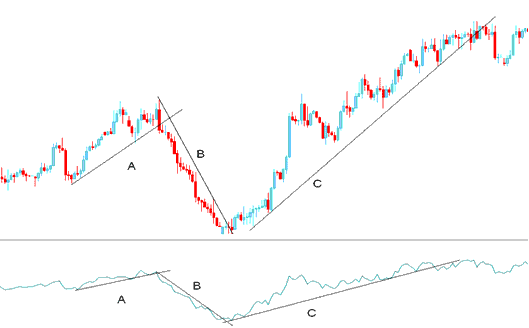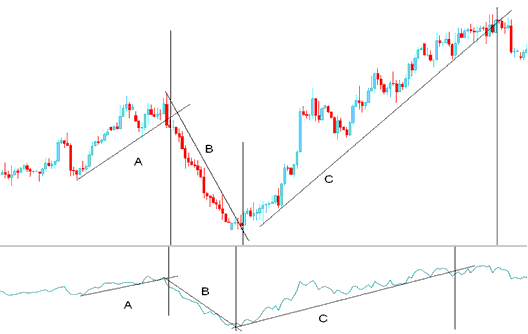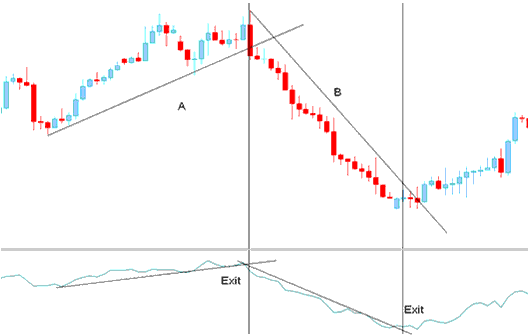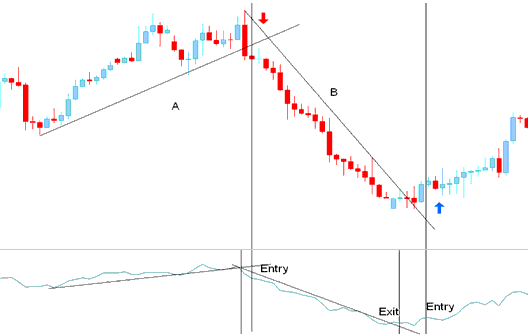Accumulation/Distribution Stocks Analysis & Accumulation/Distribution Stocks Signals
Developed by Marc Chaikins
This stocks indicator is used to assess the cumulative flow of money into and out of a stocks.
Originally used for stocks trading, when it comes to stocks trading "volume" is the amount of shares traded in a particular stock, this volume is a direct reflection of the money that is coming into and out of a stock.
The basic principle behind AD is that volume(or money flow) is a leading indicator of the stocks price. (Volume precedes stocks price).
Tick volume is the measure of stocks price changes (ticks) received by a broker during a particular trading period/interval. The tick volume is incorporated by many stock trading brokers in their charting software.
Interpretation
This volume indicator is used to determine if volume is increasing or decreasing as the stocks price on a stocks chart is rising or falling.
UpStock Trend
If the stocks price on a stocks chart is rising then the Accumulation/Distribution should also be rising. This highlights that the stocks price move is being supported by volumes and the move upwards has strength and is sustainable.
If on the other hand stocks price is moving up and the volumes are not, the strength behind the move is reducing: this creates divergence between stocks price and indicator and warns of a possible move in the opposite direction.
DownStocks Trend
If the stocks price on a stocks chart is falling then the AD should also be falling. This highlights that the stocks price move is being supported by volumes and the move downwards has strength behind it.
If on the other hand stocks price is moving down and the volumes are not, the strength behind the move is reducing: this creates divergence between stocks price and AD and warns of a possible move in the opposite direction.
Stock Technical Analysis & How to Generate Signals
Below is example of a stocks chart and the analysis explanation

From the chart above we can separate the chart into 3 parts, part A, B & C.
A - Upwards stocks trend-line on chart as well as on the Accumulation/Distribution
B - Downwards stocks trend-line on chart as well as on the Accumulation/Distribution
C - Upwards stocks trend-line on chart as well as on the Accumulation/Distribution
As long as the stocks price and the indicator are moving in the same direction then the stocks price move has enough momentum to continue moving in that direction as shown above
Stock Trend Line Break
From the above chart we can see that once the trend line on the AD was broken then the stocks price trend line was also broken.
Looking at the chart below we have added vertical lines to represent the points where the trend lines were broken, both on the stocks price chart and the indicator.
Comparing the trend lines on the indicator and the stocks price those of the AD were broken before those of the chart. This is because volume always precedes stocks price.

Trading Signals
Exit
Exit trading signals are generated when the trend line on the Accumulation/Distribution is broken. A stocks trendline break on the indicator warns of a possible reversal.

Entry
Once the trend line on the AD is broken it warns of a possible reversal in direction of the market.
However if we want to take a trade in the opposite direction it is always best to wait for a confirmation signal.
A confirmation signal is considered complete once both the indicator and the stocks price breaks both their stocks trend lines.

Entry Signal Generated by Stocks Trend Reversal
